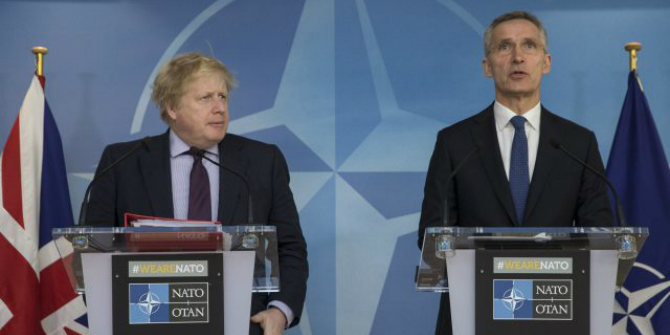
 Recent events in Salisbury have raised questions not only about the UK’s relationship with Russia, but the nature of Britain’s strategic positioning in a post-Brexit European landscape in general. Recent polling points to increased doubts among the British people about the value and fairness of the UK’s military contribution in eastern Europe, despite elite domestic consensus to the contrary. James Dennison and Tim Oliver (EUI & LSE) explore questions about Europe’s power and Britain’s broader post-Brexit strategy.
Recent events in Salisbury have raised questions not only about the UK’s relationship with Russia, but the nature of Britain’s strategic positioning in a post-Brexit European landscape in general. Recent polling points to increased doubts among the British people about the value and fairness of the UK’s military contribution in eastern Europe, despite elite domestic consensus to the contrary. James Dennison and Tim Oliver (EUI & LSE) explore questions about Europe’s power and Britain’s broader post-Brexit strategy.
Since the UK’s vote to leave the EU in June 2016, both British and EU politicians have expressed a desire to keep Britain’s contribution to NATO separate from the Brexit negotiations. In 2017, Estonian president Kersti Kaljulaid told the UK “You don’t mix different subjects… that is very important in diplomatic debates and discussions”. European Commission President Jean-Claude Juncker has also stated that “security policy issues and trade issues should not be put in the same pot.” The UK government has repeatedly reaffirmed that its commitment to the defence of Europe will be unaffected by the outcomes of the Brexit negotiations. In addition to the UK’s genuine interest in European security, this is likely an effort to preserve British influence and avoid signalling a lack of resolve in the face of Russian encroachment.
However, Theresa May has also subtly reminded her co-negotiators of Britain’s out-sized military contribution to the EU, as well as calling for a ‘comprehensive’ new security cooperation framework underpinned by a new treaty between the UK and the EU, possibly as an incentive to close a Brexit deal. Some politicians and commentators have flirted with the idea of using Britain’s defence and intelligence capabilities as direct leverage in the negotiations, not least with states in eastern Europe. Lisa O’Carroll of the Guardian recently stated “Britain actually squandered its strongest card in the negotiations, which was defence. [May] could have said ‘actually, we are not going to cooperate’ [but] it’s something that isn’t on the table”.
 Image by NATO via Creative Commons CC BY-NC-ND 2.0
Image by NATO via Creative Commons CC BY-NC-ND 2.0
The State of European Defence
It is a well-rehearsed criticism of Europeans, not least in the US, that they fail to spend sufficiently on defence, even at a time when states like Russia have shown an increased willingness to resort to force to achieve their objectives. It has come as a shock to an EU enthralled by the idea of ‘civilian power’ that hard power still matters in international relations.
In spite of this, Europe’s contribution to its own defence remains notoriously lacklustre, not only in terms of defence spending (see figure 1) but also in terms of the low equipment expenditure as a share of defence spending. Whether it is firm but friendly warnings from President Obama’s Secretary of Defence, Robert Gates, or threats from President Trump to withdraw the US from NATO unless the rest of the alliance starts spending more on defence, the patience of the US has worn thinner and thinner.

Against such a fraught defence-spending background, Britain’s debate about Brexit has inevitably touched on matters of defence and the security of Europe. Brexit seems to have soured Britons on the idea of NATO. Of the eight countries that Pew surveyed both before and after the EU referendum, the UK was the only one to see a decline in favourability towards the organisation (see figure 2). Each of the other seven countries—all NATO members with the exception of historically neutral Sweden—saw marked increases in support over the course of that turbulent year, which saw both the Brexit vote and the election of American nationalist Donald Trump.

More pertinently, when asked “if Russia got into a serious military conflict with one of its neighbouring countries that is our NATO ally, do you think our country should or should not use military force to defend that country?”, the UK was the only country to see a significant decline in those responding that they should. Conversely, Canada, France, Germany, Poland, and the USA—the only other countries apart from Spain to be surveyed in both 2015 and 2017—all saw significant increases in support for their participation in the military defence of eastern Europe.

EU leaders would therefore be unwise to assume that the current British government’s commitment to the sovereignty of eastern European states indicates that future governments will be equally dedicated. Moreover, if European countries are concerned about Russian irredentism in eastern Europe, they might be wise to incentivise Britain to retain its opt-in to the military defence of the EU with quid pro quo economic agreements that reinforce the UK’s economic capacity to continue this defence role. Otherwise, the limits of genuine ‘solidarity’ among EU member states may be exposed.
On defence, like everything else, Brexit has reopened existential questions for the UK
In the days after the Brexit vote, the Centre for European Reform, a pro-Europe think tank, characterised the UK as a “country that is decreasingly interested in other countries’ problems”. British military spending has been falling for some years and its contribution in eastern Europe should not be overstated. The above polling might point to an emerging preference in British voters for a more isolationist approach to the world or to their sympathy with Trumpian complaints about certain nations receiving insufficient payback from their commitment to NATO. This puts pressure on British decision-makers as they seek to reconcile their desire for Britain to play a leading role with the preferences of their constituents. Europe remains, as it always has been, the UK’s key strategic concern. As Churchill put it, “Europe is where the weather comes from”.
While this polling points to a change, further polling would be needed to confirm it and to explore the British people’s support for the country’s ongoing military presence in eastern Europe. Events such as those in Salisbury could reinforce or reverse the hints an isolationist trend we’ve recently seen in Britain.
This article also appeared on the Dahrendorf Forum and it gives the views of the author, and not the position of LSE Brexit, nor of the London School of Economics.
James Dennison is a Research Fellow at the European University Institute in Florence.
Tim Oliver is a Jean Monnet Fellow at the European University Institute in Florence, an Associate at LSE IDEAS, and Director of Research at Brexit Analytics.







The EU does not have a military purpose in Europe, going by what Remainers and Europhiles love to emphasise about in response to Eurosceptic fearmongering over a potential “EU Army” in future. So why this conflation of NATO military cooperation in Europe and EU economic/political cooperation in Europe? This is a red herring issue raised to muddy the waters; the UK has never said it would renege or consider cutting back its military commitment towards NATO or Europe even as Brexit terms are still being negotiated on. Furthermore, if there is a drop-off in security or intelligence cooperation between the UK and EU post-Brexit it would be because of self-imposed security clearance and sharing restrictions on the part of the EU (looking at Galileo Space Program as an example), so it is hardly fair to lay any blame on the UK for supposedly leaving Europe to her own security and military defense devices.
The UK should make it clear to the EU that all issues are up for discussion and that defence is included alongside trade, the Irish border etc. and if the EU continues to play silly games over trade, borders, access to information, contracts etc. then we will review our contribution to forces in Eastern Europe, alongside other defence issues.
Dangerous grounds to tread there. Let the EU try to conflate political/economic cooperation and possibly future union with military union, so the UK gets to hold the moral high ground and say “that’s not what we signed up for and that’s why we left for good reason”. Even if things go south in Eastern Europe with the much-feared Russian Bear amping up, they still would have to go through pretty much the entire European continent to be a clear and present strategic threat to the UK. A few spy poisonings and assassination attempts on British soil does not constitute a grave national security threat on a survival level.